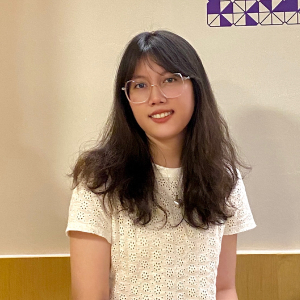Doctor of Philosophy in Artificial Intelligence and Computer Engineering (AiCE)
PhD Degree

Free consultation for this program
We are ready to help you with your difficulties and processing.
Duration
5 years
Study Format
On Campus
No. of Student Mentors
72
Total Tuition Fees
2,800,000 THB (Approx)





Free consultation for this program
We are ready to help you with your difficulties and processing.
Duration
5 years
Study Format
On Campus
No. of Student Mentors
72
Total Tuition Fees
2,800,000 THB (Approx)





Program
Key information
University
Program structure
Tuition fees
Admissions
Possible Career Pathway
Student's testimonials
F&Qs
ABOUT THIS PROGRAM
- Doctor of Philosophy in Artificial Intelligence and Computer Engineering
- 96 units technical courses (48units for students with MS) + Qual + Thesis Proposal/Defense); with breadth course options in
- Artificial Intelligence
- Human-centered Design
- Scalable System and
- Cybersecutiry
Students in the AiCE Ph.D. Program will undertake a research-intensive study of the fundamentals of Artificial and Computer Engineering. During the course of obtaining the Ph.D. degree, students will create and disseminate knowledge in their chosen area of study.
KEY INFORMATION
Degree
PhD
Language
English
Location
Thailand
Intake Start Date
Jan 2026
Study Format
On Campus
Duration
5 years
Program Highlight
Standard Program
Total Semester
10
Total Tuition Fees
2,800,000 THB (Approx) / in total
Application deadline
Apr 2026
ABOUT UNIVERSITY

1 Soi Chalongkrung 1, Ladkrabang, Bangkok 10520, Thailand Thailand
Asia Ranking 2026
Data Not Available
Programs
6
Students
Not Provided Yet
The dual-degree ECE graduate program at CMKL University is established as a collaboration between Carnegie Mellon University (CMU) and King Mongkut's Institute of Technology Ladkrabang (KMITL). By applying Carnegie Mellon’s globally acclaimed research and education programs within a regional context, CMKL tackles challenges that will drive the future development of Thailand and the ASEAN community.
In addition, CMKL University offers single-degree programs in Artificial Intelligence & Computer Engineering) and Technology & Creative Innovation. CMKL University will provide cutting-edge engineering research and education in Southeast Asia. By bridging world-class partnerships with local context, CMKL makes technologies accessible to its society and creates innovations that will benefit Thailand and the Southeast Asia region.
See more
PROGRAM STRUCTURE
Students in the Ph.D. program without a M.S. degree and students in the Ph.D. program who have an AiCE M.S. degree from CMKL must take a total of eight AiCE or related courses (totaling 96 units) at CMKL. At least seven of these eight courses must be approved graduate-level courses.
Students in the Ph.D. program who have earned a M.S. degree elsewhere (outside of CMKL’s AiCE department) must take a total of four AiCE or related courses (totaling 48 units) at CMKL. At least three of these four courses must be approved graduate-level courses.Students who received an M.S. in AiCE from CMKL may use their M.S. courses to count toward Ph.D. requirements.
Coding Bootcamp (CMKL 41-600) – 12 Units
This course provides an intensive coding program that equips students with essential coding skills.
High Performance Computing for AI Application (CMKL 41-605) – 12 Units
This course explores the infrastructure necessary to support AI applications, including both on-premise and cloud-based high-performance computing (HPC) setups. Students will learn the programming paradigms used to facilitate AI applications.
Natural Language Processing (CMKL 41-611) – 12 Units
In this course, students will delve into natural language processing, focusing on techniques and algorithms used to understand and process human language using AI methods.
Foundation of Computer (CMKL 41-613) – 12 Units
This course emphasizes a programmer’s view of how computer systems run programs, collect information, and communicate. This encourages and helps students to become more effective and efficient programmers, particularly in handling issues of performance, portability, and robustness by teaching them the basic concepts underlying all computer systems (e.g., compilers, networks, operating systems, and computer architecture).
Introduction to Information Security (CMKL41-631) – 12 Units
The course provides the foundation of information security in detail of some important technical and policy. The significant goal of the course is to encourage students to understand a security engineering perspective on information systems and consider technical, economic, and policy factors.
Foundations of Software Engineering (CMKL 41-652) – 12 Units
In this course, students will get to understand computer software engineering paradigms that shaped the software industry over the past few decades. The course will emphasize the fundamental disciplines of computer software engineering together with engineering hands-on practices that crosscut systems, projects, and perspectives of the user.
Software Requirements and Interaction Design (CMKL41-658) – 12 Units
This course refers to computer software design challenges by integrating two disciplines: requirements engineering and interaction design. Students will get an understanding of how to combine user research, design-based ideation and validation, and requirements definition, within an agile software development process.
Introduction to Machine Learning for Engineers (CMKL41-661) – 12 Units
Machine learning has become a buzzword for over a decade now and has integrated itself deeply as one of the core pillars of digital transformation. This course makes you understand the definition of machine learning and emphasis AI computer engineering applications.
Hardware/Software Co-design (CMKL 41-701) – 12 Units
This course explores how software and hardware come together to implement computer systems. The course will be extremely hands-on, with weekly development cycles. Students will learn a new concept within the language/processor stack (e.g., parsing) and will be expected to implement it by the following week.
Introduction to Computer Security (CMKL41-730) – 12 Units
This course emphasizes a principled introduction to defending against hostile adversary techniques in modern computer systems and computer networks. The topics covered operating system security; network security, including cryptography and cryptographic protocols, firewalls, and network denial-of-service attacks and defenses; user authentication technologies; security for network servers; web security; and security for mobile code technologies (e.g., Java and JavaScript).
Computer Architecture and Systems (CMKL41-742) – 12 Units
This course begins with a review of traditional, sequential computer architecture concepts.
Packet Switching and Computer Networks (CMKL41-756) – 12 Units
This course is intended to provide an understanding of the fundamental concepts in current and future computer networks.
Network Management and Control (CMKL41-757) – 12 Units
This course teaches the fundamentals of broadband networks. Broadband networks differ from existing communication networks in many ways, and these issues will be addressed in the course.
Deep Learning (CMKL41-785) – 12 Units
This course delves into deep learning techniques, covering advanced algorithms and methodologies used in training deep neural networks. Students will gain expertise in the field of deep learning.
Image and Video Processing (CMKL41-793) – 12 Units
This course focuses on signal processing techniques for 2D (images) and 3D (videos) signals. It extends 1D signal processing techniques and specializes in image and video processing.
Research, Entrepreneurship and Innovation (CMKL41-900) – 12 Units
This unique course for AiCE program introduces students to explore the connections between research, entrepreneurship and innovation. Students will be introduced to industries and tech communities.
Research and Development (CMKL41-910) – 36 Units
Students in AiCE programs will have the opportunity to participate in real-world supervised research and development projects.
Internship for Graduate (CMKL41-995) – Variable
Experiential learning experiences are key educational possibilities for graduate students in the Artificial Intelligence and Computer Engineering department. An internship, which is usually conducted during the summer, is one such alternative.
Graduate Teaching Internship (CMKL41-999) – 12 Units
The Teaching Internship for AI and Computer Engineering MS Students represents the capstone or culminating experience at CMKL University in the preparation of prospective lecturers as knowledgeable, reflective practitioners and emerging leaders who conduct themselves ethically and professionally.
TUITION FEES
Tuition fees
2,800,000 THB (Approx) / in total
Application fees
2,500 THB
Application fee cannot be refunded.
Get a Free Consultation!
Not sure where to start with your application?
Our student ambassadors can walk you through the admission process, step by step.
ADMISSIONS PROCESS

- Hold a bachelor’s degree in any field of study,
- Transcript
- Statement of Purpose
- Recommendation Letters (2 minimum, 3 maximum)
- Have English test score from one of the following:
- Duolingo English Test - A minimum overall score of 105 is required, with minimum sub-scores of Literacy-105, Comprehension-115, Production-70, Conversation-95.
- TOEFL Exam - A minimum overall score of 84 is required, with minimum sub-scores of IBT-R 22, IBT-L 22, IBT-S 18, and IBT-W 22 are required. These requirements must be met from a single test date - we currently do not accept TOEFL MyBest scores.
- IELTS Exam - A minimum overall score of 7 on the IELTS is required, with minimum sub-scores of Reading-6.5, Listening-6.5, Speaking-6, and Writing-6.
- Resume, CV, or Portfolio (Optional)
- Have GRE test score (Optional ; F2024 - S2025)
** All international applicants whose “native” language is not English must take an English Language proficiency exam. The scores must be received by the application deadline for the semester in which students are applying. An English Language proficiency test is not required if the applicant graduates from a U.S. university by the time of enrollment, or if the applicant is a CMU student or alumni.**
Breadth Area Requirement
The AiCE Program has defined four technical areas (plus an ‘Other’ area) to insure breadth of knowledge for the Ph.D. degree. Students are required to select one of these areas to fulfil their breadth requirements. The breadth areas are:
- Artificial Intelligence
- Human-centered Design
- Scalable Systems
- Cybersecurity
- Other (by petition)
Each Ph.D. candidate must take at least one graduate class from at least four of these areas to fulfil the breadth requirement. Students must receive a "B-" grade or better in these courses.Students may be able to count one course taken during a previous degree toward the breadth course requirement by petitioning AiCE's Graduate Studies Committee. If the petition is accepted, only two more breadth areas must be satisfied. However, students will still be held to the same course requirements.
Qualifying Exam Requirement
Students who are working towards a Ph.D. degree are required to take the Ph.D. Qualifying Examination. The Ph.D. Qualifying Examination tests the student’s ability to think, speak, and write. Students must read and analyze three technical papers that define the examination topic area. Students then write a review paper and orally present this review to a faculty examining committee.
Teaching Internship
All AiCE Ph.D. students are required to complete two Teaching Internships (“TI”) at CMKL – over the course of the Ph.D. program. These Teaching Internships are unpaid and students will receive a letter grade reflecting their performance. Students must receive a “B” or better in the TI course to receive credit for completing the teaching internship. The TI program is coordinated through the Academic Services Office. All students must complete a teaching assistant application for the TI to be formally recognized by the department. The Academic Services Office will work with the student to enroll him or her in the correct course representing their work as a TI prior to the start of the semester.
Dissertation
All Ph.D. students are required to prepare a dissertation proposal within four semesters following the successful completion of the Ph.D. qualifying examination. This time clock begins with the semester following the qualifying examination. If a student leaves for a semester to return to the industry, this four-semester clock is stopped. The Ph.D. prospectus clock stops when the student leaves and resumes at the start of the semester when the student returns. Students who have not met their Ph.D. prospectus requirement within the four-semester time limit must discuss a revised timeline with their advisor prior to the semester’s Graduate Progress Review faculty meeting.
Ph.D. Dissertation Defense
Once the Ph.D. dissertation is written, the student must submit the Defense Declaration form to the Graduate Affairs Office at least two weeks before the student’s defense date. The Thesis Committee is usually the same as the Prospectus Committee. If there is any change in the committee, the student must submit a biographical description of any new committee member from outside CMKL for approval. Additionally, students are expected to adhere to AiCE guidelines on providing defense committees with a copy of the thesis prior to the defense. AiCE recommends that students provide their committee with a copy of the thesis at least one and a half months prior to the defense.
Possible Career Pathway
Solve problems by applying engineering fundamentals and providing solutions that reflect the depth and understanding of technology, drawing upon multiple disciplines and considerations for the problem.
Demonstrate creativity in their engineering practice, able to consider a system-oriented approach in their design and able to strategically plan and execute successful engineering projects in their own businesses or organizations
Apply AI techniques to major aspects of computing, including human-centric design and visualization, scalable and distributed computing systems, privacy, and security.
Participate in real-world, supervised research and development projects with university partners.
Understand the limits of AI and computer engineering systems and apply these techniques within these limits.
STUDENT's TESTIMONIALS
No testimonials available just yet — stay tuned!
FAQs
Question :
IS CMKL THAILAND CAMPUS AN ENGLISH SPEAKING CAMPUS?
Answer :
CMKL is entirely English speaking for its programs.
Question :
WHAT DEGREES WILL I EARN AFTER GRADUATING?
Answer :
Upon graduation from the AiCE program, students will earn a Bachelor of Engineering in Artificial Intelligence & Computer Engineering from CMKL University.
Question :
WHAT IS THE EXACT TIMELINE OF THE AiCE PROGRAM?
Answer :
The B.Eng. in AiCE is a four-year program. Students will spend their four years at CMKL, Thailand. Importantly, The three-year accelerated study plan is also available. It is a unique opportunity to complete AiCE undergraduate study in a shorter time frame. An accelerated study plan for students wishing to complete a baccalaureate degree in three years. Pre-matriculant credits (such as Advanced Placement, International Baccalaureate, or college credits earned during high school) prior to the start of undergraduate study is highly desirable. Graduating early translates into reduced costs, entering the job market sooner, or moving on to graduate school earlier, if desired.
Question :
WHAT MAKES AiCE PROGRAM AT CMKL IS DIFFERENT FROM OTHER ENGINEERING PROGRAMS?
Answer :
CMKL University has been established to offer collaborative research and education between Carnegie Mellon University and King Mongkut’s Institute of Technology Ladkrabang for its dual-degree graduate programs in Electrical and Computer Engineering. Building on the knowledge of this collaboration, CMKL continues to offer single-degree programs in Artificial Intelligence & Computer Engineering (AiCE) for undergraduate and graduate levels – Thailand's first integrated bachelor's degree in artificial intelligence and computer engineering! CMKL is a hub of national AI supercomputing research infrastructure that provides cutting-edge engineering research and education in Thailand and Southeast Asia. Our faculty come from areas with a deep focus on AI and computer engineering. The program allows individuals to interact with all these key disciplines. Leading CMKL faculty experts will guide students through the latest breakthroughs in research, cutting-edge technologies, and best practices used for building effective AI systems. The AiCE program is designed to focus on the required knowledge area & relevant application domains where AI technologies can be applied. The curriculum consists of 4 pillars of knowledge area: Artificial Intelligence, Human-centered Design, Computer Systems, and Cybersecurity. Students will also apply their AI & computing skills by working on domain-specific research & application, including Medical Science, Business & Finance, Logistics, Gaming & Creative Industries, and Education.
Question :
IS THERE ANY ACCOMMODATION FOR STUDENTS AND HOW MUCH DOES IT COST?
Answer :
We currently do not have a university-owned residence hall. However, we do have a list of CMKL-sourced accommodations close to campus for the students. Students are able to contact the residences themselves directly. The price starts from 5,000THB up to 7,000THB monthly.
Question :
WILL CMKL OPEN MORE PROGRAMS IN THE FUTURE?
Answer :
Currently, we are striving to support students mainly in the Computer Engineering field. There is a possibility for more related degree options in the future.
Question :
WHAT OTHER EXPENSES WILL I HAVE?
Answer :
Besides tuition and fees, students are responsible for CMKL mandatory fees; premium health insurance, transportation fee, technology fee, and student activities fee.